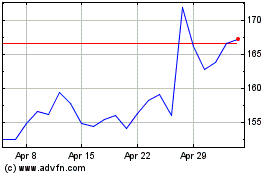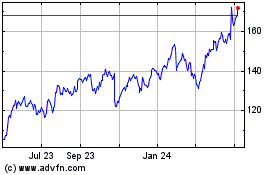By Ian Lovett and Jack Nicas
LOS ANGELES -- Prager University, a nonprofit that produces
short, educational videos from conservative perspectives, is suing
YouTube and its parent company, Google, claiming the tech giant is
illegally restricting some of its content as part of a wider effort
to silence conservative voices.
A lawsuit filed Monday evening in federal court in San Francisco
says YouTube's more than 30 million visitors a day make the site so
elemental to free speech in the digital age that it should be
treated as a public forum. The suit argues the site must use the
"laws governing free speech, " not its own discretion, to make
decisions about what to censor.
The nonprofit, known as PragerU, alleges that by limiting access
to some of its videos without clear criteria YouTube is infringing
on PragerU's First Amendment rights.
YouTube said it didn't have immediate comment because it hadn't
yet reviewed the suit. The site is owned by Google, part of
Alphabet Inc.
The suit heightens a debate over tech companies' increasing
influence on public opinion and how they should police content on
their sites. With the internet enabling the spread of
misinformation, hate speech and foreign propaganda -- especially
around the 2016 U.S. election -- politicians, academics and the
media are increasing scrutiny on the role a handful of tech giants
play in modern society.
Since last year, more than three dozen PragerU videos -- on
subjects including the Korean War and Israel and Palestine -- have
been restricted by YouTube. As a result, those who use YouTube in
"restricted mode," including students at some universities and
children whose parents have put parental control filters in place,
are prevented from seeing the videos; all potential ad revenue from
the videos is also cut off.
YouTube hasn't pulled the videos from the default version of its
website or mobile app, which are how the vast majority of users
access videos.
YouTube has long championed itself as an open platform for ideas
and is more often criticized for its reluctance or delay in
removing objectionable content. "We believe everyone should have a
voice," YouTube said in a blog post in March. "Since our founding,
free expression has been one of our core values."
PragerU's suit fits into more recent criticism from
YouTube-video creators of the site's push to remove ads from
certain videos -- prompted by a backlash from advertisers.
"There's a difference between the free expression that lives on
YouTube and the content that brands have told us they want to
advertise against, " YouTube said in the March post.
PragerU was founded by conservative radio host Dennis Prager in
2011.
In email exchanges with PragerU, which were reviewed by The Wall
Street Journal, YouTube declined to offer specific explanations
about why most of the videos were restricted, saying that they
"aren't appropriate for younger audiences."
In those emails, a YouTube representative told PragerU officials
that some of the videos that were censored were reviewed "manually"
by humans, not solely by an automated system.
One of the videos that was initially restricted by YouTube
featured Kimberley Strassel, a Wall Street Journal columnist who
writes for the Journal's opinion pages. The restriction of the
video was later lifted.
The lawsuit lists videos on similar subjects by other content
creators -- including Al Jazeera and The Daily Show -- which
weren't restricted, and argues that PragerU was targeted solely for
its conservative views.
"Google/YouTube uses their restricted mode filtering not to
protect younger or sensitive viewers from 'inappropriate' video
content, but as a political gag mechanism to silence PragerU," the
complaint says.
The suit escalates a battle between YouTube and content creators
over how much control the tech giant should exercise over what is
posted on the site.
YouTube faced a firestorm earlier this year when news reports
revealed the site was running ads on extremist and racist videos,
causing a series of big brands to pull spending from the site.
The backlash prompted YouTube to better police content on its
sites, pull more ads from "hateful, offensive and derogatory"
videos and give advertisers more control over where their ads
appear. Those changes include technology to automatically screen
videos as well as more human reviewers to pull ads from
objectionable videos.
Some advertisers still remained off the site even months after
the changes.
As a result, many of YouTube's most popular video creators have
complained of a drop in their ad revenues.
There are also signs that YouTube is trying to move away from
the fringe content that attracts many of its viewers -- but also
creates headaches with advertisers. After searches on YouTube about
the mass shooting this month in Las Vegas surfaced videos peddling
conspiracy theories, the site said it was tweaking its search
algorithm to promote more authoritative news sources.
The lawsuit alleges that the criteria YouTube uses to restrict
videos is so broad that it effectively allows the company
unfettered discretion, with no objective standard at all.
In addition, the suit says that the standards the company does
use are being applied unfairly to PragerU.
Pete Wilson, a former governor of California who is representing
PragerU in the suit, said the restrictions on the nonprofit's
videos were part of a wider effort to limit conservative
speech.
"Just as on many college campuses, there has been a refusal to
allow conservatives to speak," Mr. Wilson said. He added of
YouTube, "They have incredible reach, and that really sets them
apart from almost any other entity."
Write to Ian Lovett at Ian.Lovett@wsj.com and Jack Nicas at
jack.nicas@wsj.com
(END) Dow Jones Newswires
October 23, 2017 22:39 ET (02:39 GMT)
Copyright (c) 2017 Dow Jones & Company, Inc.
Alphabet (NASDAQ:GOOGL)
Historical Stock Chart
From Mar 2024 to Apr 2024

Alphabet (NASDAQ:GOOGL)
Historical Stock Chart
From Apr 2023 to Apr 2024
